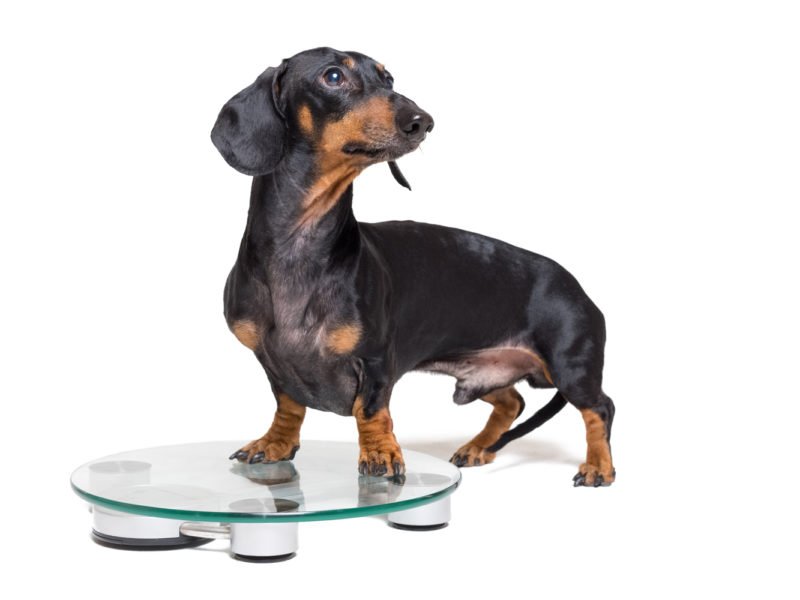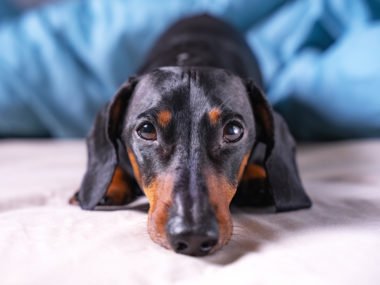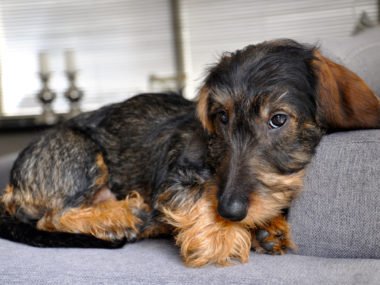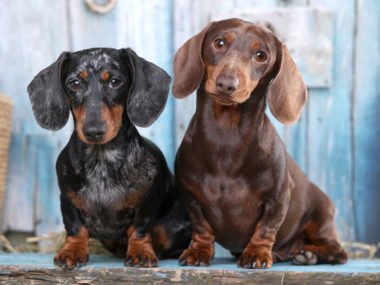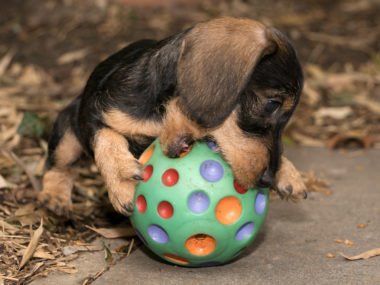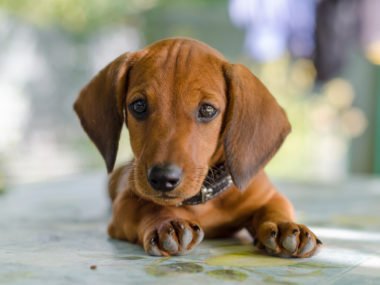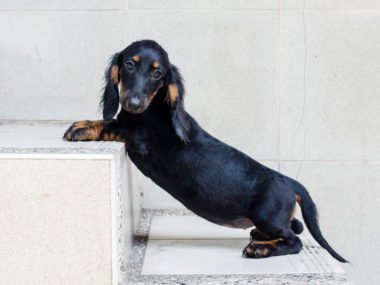Working out the healthy weight for your dachshund can be tricky, but it’s really important you do. An overweight dachshund is at higher risk of health problems. Their long body means they’re prone to back issues and if overweight, they’re even more likely to get injured.
What is the ideal weight for a dachshund? At full size, a miniature dachshund should weigh less than 11 pounds and a standard dachshund between 16-32 pounds, depending on body height and length. A healthy dachshund will have a defined waistline and you’ll be able to feel their ribs with your hand.
Weighing your dachshund is a quick way to track whether he’s gaining or losing weight, but the scales won’t tell you if your dog is the weight he should be. Read on to find out how to check your dachshund over yourself and what behavioural signs to look out for.
Table of Contents
Is my dachshund overweight?
Your dachshund could be overweight if:
- You can’t feel your dachshund’s ribs
- You can’t see much (if any) definition
- There are fat rolls on his withers
- He’s slow and tired
- He isn’t interested in playing
- He’s in his senior years
According to breed standard guidelines, miniature dachshunds should weigh less than 11 pounds and standard dachshunds between 16-32 pounds. The thing is, dachshunds come in so many different shapes and sizes. Some miniatures are naturally larger and some standards are smaller – and that’s totally normal. So if you want to know whether your dachshund is overweight, it may be easier to just check him over yourself and keep an eye on his behaviour.
This is what you need to know:
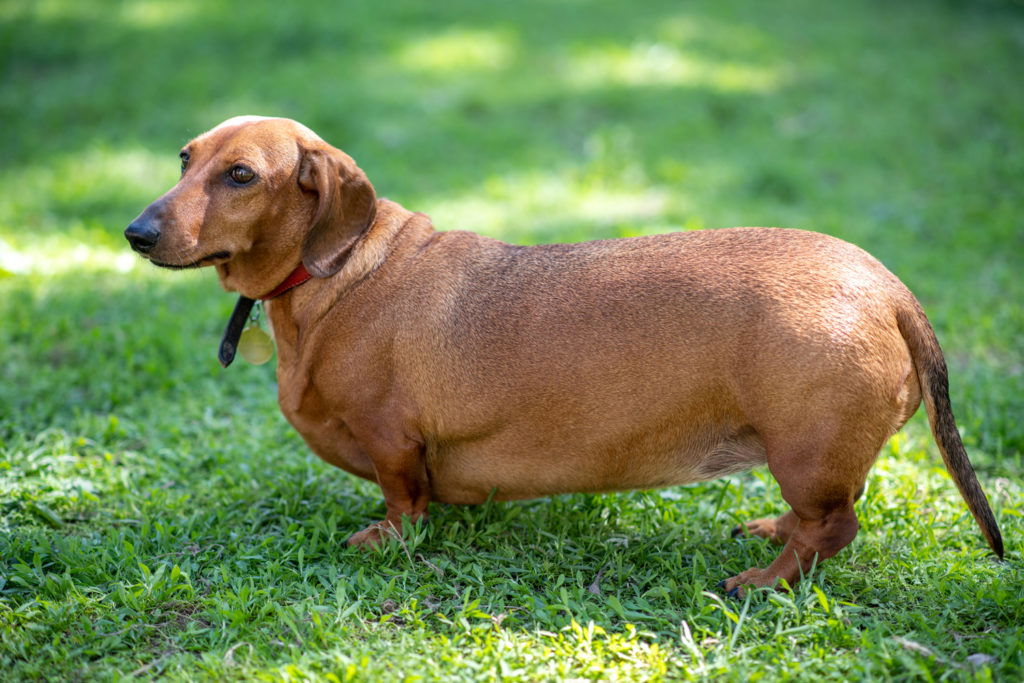
You can’t feel your dachshund’s ribs
When you run your hand across your dachshund’s ribcage, there should be a thin layer of fat, but it should also be fairly easy to feel his ribs. If you can’t feel them at all, your dachshund is way fatter than he needs to be and is definitely overweight. Also – if your dachshund’s ribs are visible, especially from a distance, it’s a sign he actually need to eat more, not less.
You can’t see much (if any) definition
Yes, it’s cute if your sausage dog looks like an actual sausage, but if there’s too much fat around his tummy and no defined muscle or tuck by his waistline, your dachshund is at risk of serious health issues. All dogs should have clear definition – dachshunds’ stumpy appearance doesn’t mean they’re an exception to this! If he’s a healthy weight, it’ll be easy to see his waist and hips when you’re looking at him from above.
There are fat rolls on his withers
Have a feel of your dachshund’s withers (the spot just below the neck, in between the shoulder blades). If there are rolls of fat here, it’s a sign he weighs too much and a signal for you to do something about it.
He’s slow and tired
If your dachshund suddenly seems less energetic and more sluggish than usual and is spending loads of time sitting or lying down, it could be a sign he needs to be eating a bit less.
He isn’t interested in playing
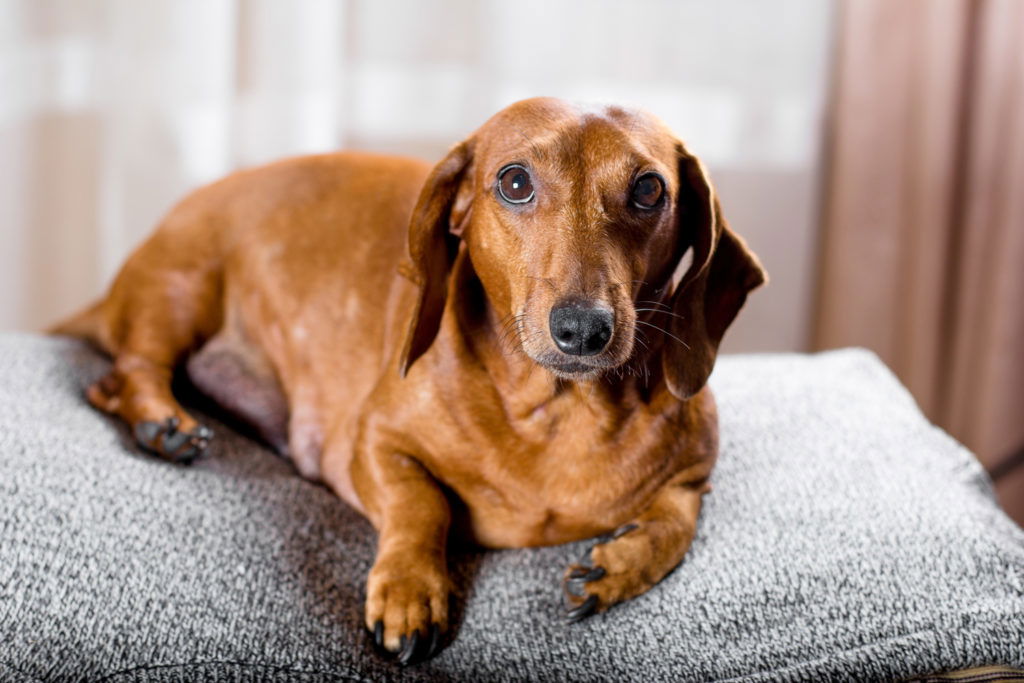
Dachshunds are playful and enthusiastic little dogs who enjoy being outside – they were originally bred to hunt small animals through the undergrowth! So if he suddenly loses interest in playing at the park, it might be because he’s carrying too many extra pounds!
He’s in his senior years
Older dachshunds are more interested in sleeping under a cosy blanket than being in the great outdoors. Their metabolism will also slow down as they age. So if your dachshund is less active and still eating the same amount of food he always has, it may be time to review. Check with your vet and don’t make any drastic changes. Do things slowly and gradually over time.
When should I visit the vet?
If you aren’t sure whether your dachshund is the weight he should be, or he’s showing any signs of ill health, visit your vet for professional advice.
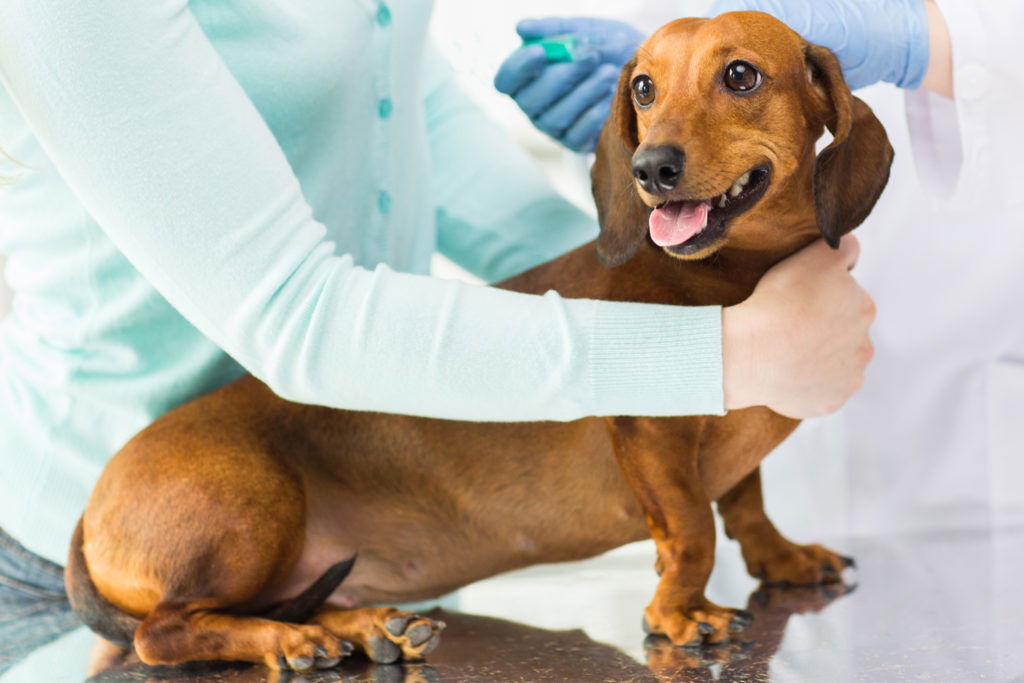
Why do dachshunds get fat?
This is why dachshunds get fat:
- Dachshunds are prone to obesity
- They’re not getting enough exercise
- Dachshunds are greedy
- Genetics pay a part
- Neutering may cause weight gain
This is what you need to know:
Dachshunds are prone to obesity
Dachshunds are more prone to obesity than other dog breeds – mainly because of their small size and short legs. Carrying your dachshund to stop him climbing up and down stairs is great for his back, but not so great for his health and fitness.
They’re not getting enough exercise
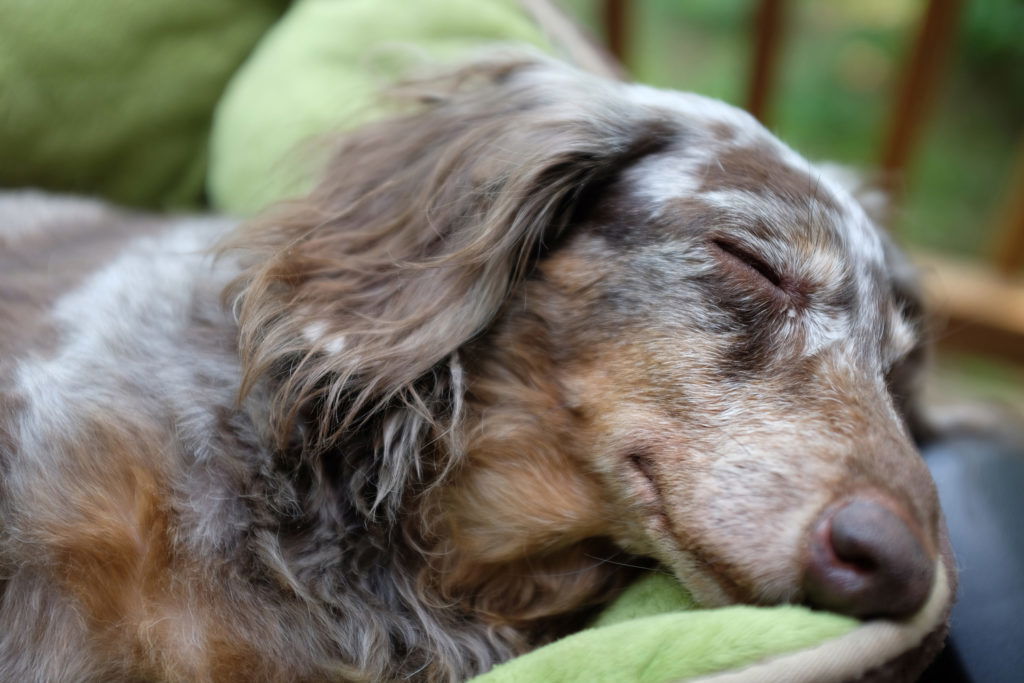
Miniature dachshunds need a minimum of 30 minutes exercise a day and standard dachshunds need 60 minutes or more, depending how energetic they are. They may have slightly different exercise requirements, but both need to stretch their little legs every single day. Without any exercise, they will put on weight.
Dachshunds are greedy
Dachshunds are greedy little dogs – they’ll eat, eat, and eat more unless you stop them! And, if they overeat, they’ll gain weight very quickly. They just won’t understand the harm they could do to themselves, so it’s your job to control what they’re eating!
Genetics play a part
Your dachshund might also be genetically predisposed to obesity. Genetics play a big part in whether your dachshund will get fat. If his parents were overweight or gained weight as they got older, there’s a high chance your dachshund will pile on the pounds too. It’s worth knowing this so you can put a healthy routine in place from day one.

Neutering may cause weight gain
There is some debate over whether neutering does cause dachshunds’ to gain weight. Any extra pounds could be due to the fact he’s calmed down a lot and isn’t so active any more. Regardless of who’s right and wrong, if you get your dachshund neutered, keep an eye on his weight. You might need to reduce the amount of calories in his diet and increase his exercise too.
How does my dachshund lose weight?
If your dachshund needs to lose weight, this is what you need to do:
- Visit the vet
- Cut back on treats
- Don’t feed him human food
- Increase daily exercise
Visit the vet
Getting your dachshund to lose weight as quickly and safely as possible is super important – the longer he’s overweight, the more likely it is he’ll suffer from long-term health problems. If you think he is overweight, or he’s gained a lot of weight in a short amount of time, the first thing to do is take him to the vet. Weight gain can sometimes be a sign of illness so you must get this checked out first to rule out any serious conditions.
Cut back on treats
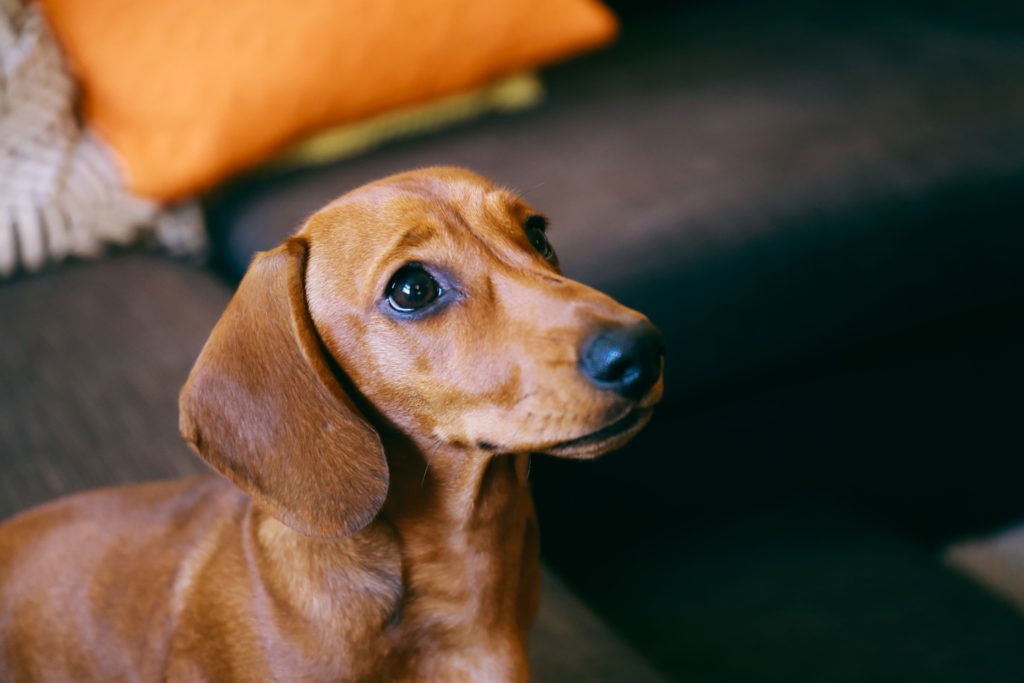
When you’re working out how much food your dachshund should eat, it’s easy to lose track of the extra calories in the treats he’s eating. A few treats throughout the day is OK but you really should limit them and stand firm. If you’re training him at the moment and need something to reward him with, swap out store-bought treats for healthier snacks like raw carrots, cauliflower, or green beans – it’ll be cheaper for you and dachshunds love raw food too!
Don’t feed him human food.
Human food wasn’t meant for dachshunds, so it’ll make them put on weight. Sausage dogs are also prone to diabetes, and feeding them your food could increase their risk of becoming diabetic. If you want to know what sort of food your dachshund should be eating, click here.
Increase daily exercise
If your dachshund doesn’t get much exercise, try adding a short daily walk or two into his life. Don’t over-exercise your dachshund – keep the exercise regular, but gentle so it’s not too hard on his legs.
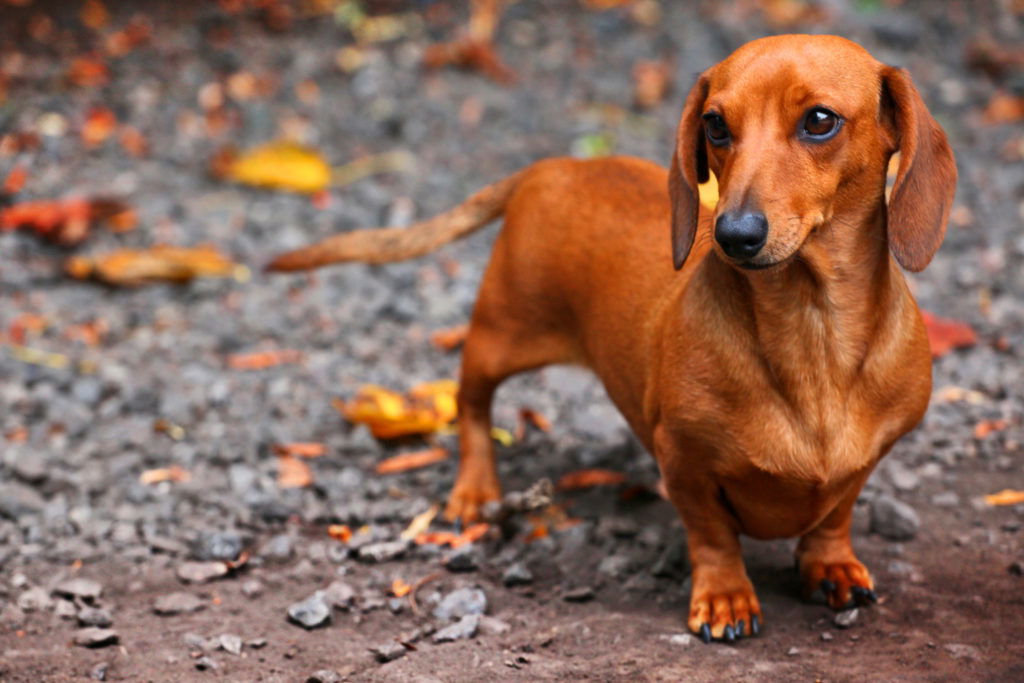
Be patient with your dachshund. Remember – this won’t, and shouldn’t, be a quick process (they’re not going to lose all that weight at once!). Your dachshund needs to lose weight slowly so take your time. Don’t make any dramatic changes to his diet which could lead to nutrition deficiencies.
So, there you have it. Dachshunds are prone to obesity and you do need to watch their weight. Get them into a healthy feeding and exercise routine when they’re young to give them with the best care and happiest life.

